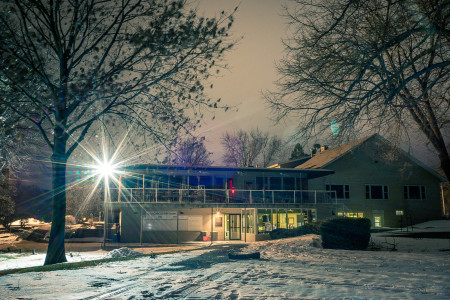Lily Bohlke, Copy Editor
bohlkeli@grinnell.edu
On Tuesday, Feb. 9, the Grinnell Golf and Country Club membership voted 107-1 to sell the Club to the college, according to a campus memo. The former country club will be run as a public resource with an open golf course and swimming pool.
The Golf and Country Club was founded as a non-profit membership organization by college faculty in 1899, according to Kate Walker, Vice President for Finance and Treasurer of the college.
Since then, the club has experienced some financial difficulties. In 2001, the college invested 50,000 dollars to support the club. As the largest single investor in the club, the college was promised first right of refusal on any possible sales.
“Over the past few years, the country club has been in a death spiral,” Walker said. “They wanted to talk with us about whether or not we wanted to exercise the option to buy it.”
Before deciding, the treasury department began conducting due diligence by looking at financial statements, taking tours and talking with vendors and employees before the college ultimately decided to make an offer. Investments into renovations will also need to be made.

These initial investments are from the Strategic Reserve, a fund the college allocates for acquisition and initial upgrades, according to Walker.
“The money we used to purchase the golf course came from the Strategic Reserve. The funds in that reserve are set aside specifically to allow agility in response to strategic opportunities,” Walker wrote in an email to The S&B after interview. “They are not part of our operating budget and they do not factor into operating decisions such as, for example, how we set tuition.”
Eventually, maintenance fees will come out of the operating budget, which funds the cost of compensation for faculty, staff and student employees, program expenses and service on debts.
“We’re not expecting to break even or make any money the first few years,” Walker said. “Ultimately, the goal will be a break-even operation, exploring revenue options to offset operating costs.”
One reason the college felt the purchase of the club was a necessary investment was to have a degree of control over the land directly adjacent to campus. The college agreed to maintain a golf course, which was one of the major requests from the club board.
“The opportunity to pick up 56 acres of beautiful space that we already use for our own golf team directly adjacent to campus was something that doesn’t come along very often, if at all,” Walker said.
However, some students do have mixed feelings about this purchase. Rafael Estrada ’18 feels the purchase of a golf course tells students they are not the college’s first priority.
“There are clear demands by students for greater spending on other resources that are desperately needed,” Estrada said. “If they’re putting more money into purchasing golf courses, then they’re putting less money into hiring a psychiatrist on campus.”
Although Alex Mitchell ’17 views it as a sound investment, he feels purchasing a golf club sends a strange message to the town in addition to the campus community.
“A lot of students have been talking about how that money could go to tuition, making buildings more accessible. What bothers me is that even if we hadn’t purchased the country club, those problems would still exist,” Mitchell said. “I’m frustrated that I go to an institution where we’re building this new ARH building, but I am almost positive the Stonewall Research Center will still be in the basement of Younker. It’s kind of a trend we’ve seen at Grinnell, where we spend money because we have money but then we save money that we don’t need to save.”
Another critique of the purchase is the uppity attitude of a social justice-oriented college owning a country club. As a student from the town of Grinnell, Mitchell noted that, coming from a more middle class family, the country club is tucked in the Northwest corner of town, “the wealthy part of town.”
However, as mentioned by Walker, the concerns expressed by students primarily regard the spending of the operations budget, not the Strategic Reserve, which supplied the funding for the golf course and has strictly designated uses.
According to Walker, the space will be no longer run as a country club, but as a public resource.
“The idea of a limited access country club controverts our institutional commitment to making this a community resource. Under College ownership, the golf course will become a public course, open to use by all,” Walker wrote. “We will recognize and welcome past members, but we will no longer promote ‘members only’ privileges or events.”
According to Walker, this change to the golf course’s structure will make it more accessible to the town and any travelers coming through.
“We want good partnerships,” Walker said. “We’re not trying to take over downtown, but rather we want to complement it.”
The treasury department’s goal is to have a symbiotic relationship with the town, not a competitive one.
“It’s our goal to develop good community partnerships that complement and build on Grinnell’s strengths,” Walker wrote. “If the College is going to be strong, we need the town to be strong. And for the town to be strong, the College needs to be strong.”



































































